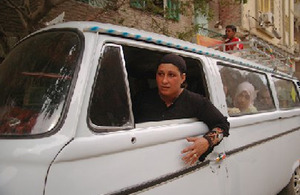DFID Research: Conditional Cash Transfers pilot scheme in rural Egypt
Research conducted for the DFID-funded Pathways of Women's Empowerment Programme has been used to design a feminist Conditional Cash Transfers scheme in Egypt

CCT Women in car. Picture: Pathways of Women's Empowerment
Background
The Ain es-Sira Conditional Cash Transfers (CCT) pilot progamme in Egypt is one of the first of its kind to be launched in the Arab world. The programme works with ultra-poor families, especially mothers and female heads of households with school-aged children, in the Cairene slum of Ain es-Sira. In total 160 families directly benefit from cash transfers and contact with social workers through participation in this scheme.
In efforts to inform the design of a feminist CCT programme more than 2 years of qualitative and quantitative research was carried out, as part of the DFID-funded Pathways of Women’s Empowerment Programme, to understand the needs of these families. The researchers looked at their health, decision-making role in the household, access to resources, work, income and debt.
Designing a programme from a feminist perspective has involved a large number of Egyptian and international social scientists and economists, and has led to the scaling-up and adaptation of the programme in rural Upper Egypt. More than 200 social workers are now trained in implementing and monitoring the families participating in the progamme. Subsequently it has led to changes in the social protection policy in Egypt and will aid in the definition of a target criteria for poverty.
What happened?
Researchers led by Dr. Hania Sholkamy and her team at the Social Research Center of the American University in Cairo (AUC), launched the CCT pilot scheme during March, 2009, calling for applications from potential families to be involved in the progamme. The participating families were selected in June 2009. They received a monthly cash transfer and engaged in regular visits with social workers to monitor commitment to the conditions attached to the transfers, for example, child school attendance, visits to the health clinic and attendance at awareness sessions on nutrition, finances and health. Medical check-ups for the families were administered in August 2009 and data gathered was used as a health baseline in efforts to monitor and evaluate the pilot. In November-December 2009, data from interviews were gathered and compiled to inform a gender assessment.
The team conducted weekly meetings with the social workers and the ministerial committee, supervising the pilot and providing support to the families in Ain es-Sira. The team also received additional funding from UNICEF and UNDP for upcoming work on piloting the CCT scheme in 65 villages in Upper Egypt. A trip to Assiut in Upper Egypt was carried out in January 2010 and to Sohag in February 2010 to train the social workers who will be working on the 65 Villages CCT scheme, projected to start in August 2010.
Outcomes
As a result of this programme, the health center in Ain es-Sira now receives a higher number of patients from the neighbourhood and the local NGOs have been encouraged to plan an after-school activities programme for children in the area. The research team is trying to involve the AUC and wider community in the project, by inviting filmmakers, artists, journalists, architects and businesses to work in the neighbourhood.
CCT programmes are widely popular across the world, particularly in Latin America, where countries like Brazil and Mexico work with thousands of families. Aside from Morocco, Egypt is the only Arab country to implement a CCT scheme. The Social Research Center’s success in working with the Ministry of Social Solidarity to implement a gender-sensitive pilot in Ain es-Sira and prepare for the launch of a CCT programme in 65 villages in rural Upper Egypt is a clear indication of impact on policy.
“After 6 months of the programme intervention in Ain es-Sira, I can tell you about successful stories there. Women, really, their lives have changed a lot since the very beginning. In the beginning, they are afraid from their husbands about going to the programme or not… but now they can discuss everything about their lives with their husbands and maybe convince them or sometimes take positions without asking him. It’s not a kind of bad manners but actually now they are capable more than in the past to direct their lives.” (Mohamed Hassan, member of the Ain es-Sira research team)
“In a sense, what we found is that women don’t have the time, ability, information and resources to take good care of their health and we want to encourage them to do so but we, of course, don’t want to forget the fathers so we are focusing on both adults in the family together.”(Lenka Benova, member of the Ain es-Sira research team)
More information
The Social Research Center at the American University in Cairo and the Institute of Development Studies participated in this project, conducted as part of the Pathways of Women’s Empowerment programme.